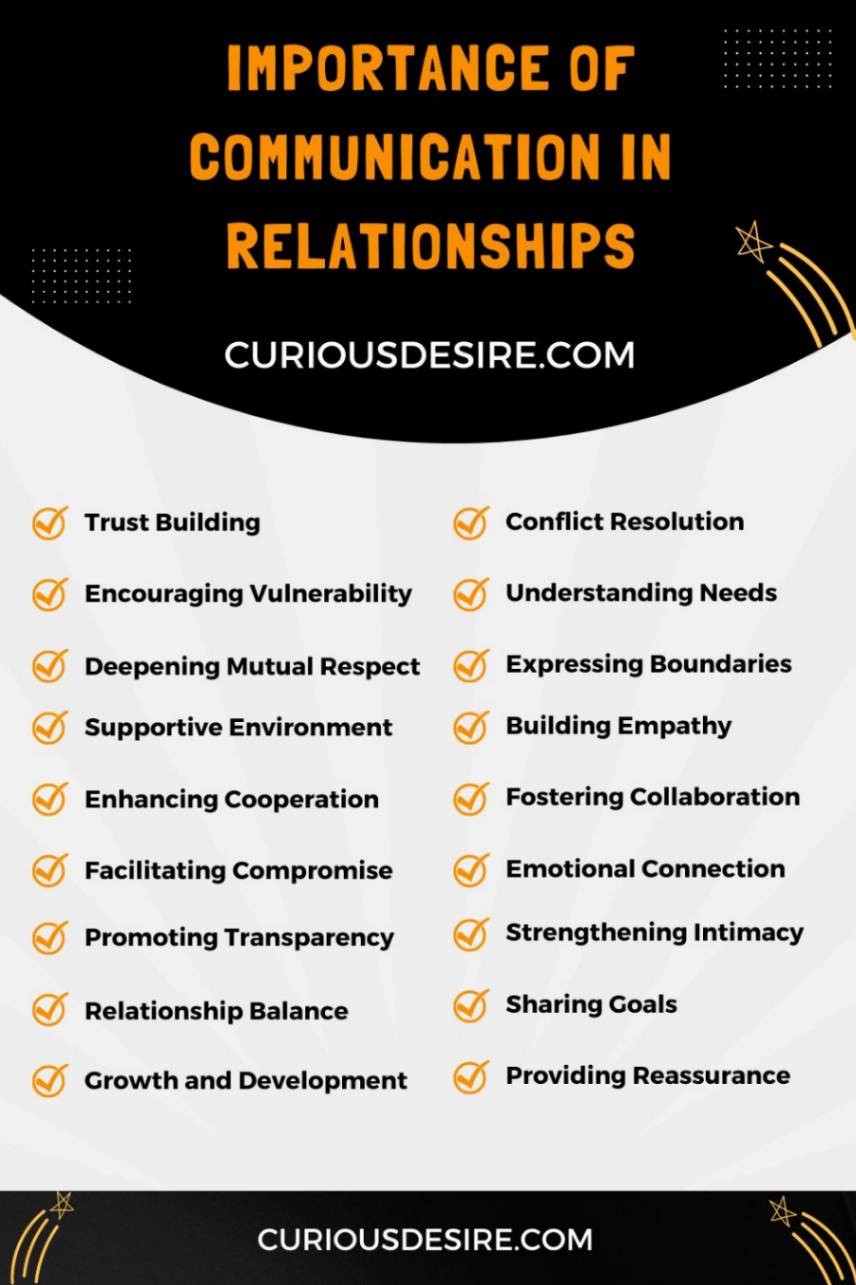In any relationship, whether it’s with a partner, family member, or friend, communication serves as the cornerstone for promoting understanding, trust, and connection.
The ability to express thoughts, feelings, and needs effectively is fundamental to building healthy and fulfilling relationships. Without communication, relationships can falter due to misunderstandings, unresolved conflicts, and feelings of disconnect.
In this article, we explore the importance of communication in relationships, highlighting why it matters, why it is essential, and why it is mandatory for nurturing strong and lasting connections.
We will explore 20 key aspects of communication’s importance in relationships, demonstrating how each plays a vital role in building and sustaining meaningful bonds between individuals.
From trust-building and conflict resolution to promoting growth and enhancing satisfaction, effective communication underpins every aspect of a successful relationship journey.
Here are the 5 common reasons for the importance of communication in relationships:
- Trust Building
- Conflict Resolution
- Emotional Connection
- Understanding Needs
- Strengthening Intimacy

1. Trust Building
Communication plays an important role in building trust within relationships because it allows partners to be open, honest, and reliable with each other.
When partners communicate effectively, they share their thoughts, feelings, and concerns, creating a foundation of transparency and understanding.
For example, when one partner communicates openly about their whereabouts and plans, it reassures the other partner of their reliability and promotes a sense of security.
This transparency and reliability build trust over time, strengthening the bond between partners.
Without effective communication, doubts, suspicions, and misunderstandings can arise, leading to the erosion of trust and strain on the relationship.
2. Conflict Resolution
Effective communication in relationships is vital for constructively resolving conflicts.
When partners communicate openly and respectfully during disagreements, they can express their viewpoints, listen to each other’s perspectives, and work towards finding mutually satisfactory solutions.
For instance, when partners calmly discuss their differences instead of resorting to yelling or avoidance, they demonstrate respect for each other’s feelings and opinions, leading to a more harmonious resolution.
By engaging in constructive communication during conflicts, partners can address issues effectively and prevent resentment from building, ultimately strengthening their relationship.
3. Emotional Connection
Communication plays a key role in promoting an emotional connection between partners. Through verbal and nonverbal communication, partners express their love, affection, and care for each other, deepening their emotional bond.
For example, when partners engage in heartfelt conversations, share their joys and sorrows, and offer empathetic support, they create a sense of closeness and understanding.
By consistently communicating their emotions and actively listening to each other, partners nurture a strong emotional connection that enhances their relationship satisfaction and resilience.
4. Understanding Needs
Effective communication allows partners to understand and fulfill each other’s needs within the relationship.
By openly expressing their desires, preferences, and concerns, partners can ensure that their emotional and practical needs are met.
For instance, when partners communicate about their expectations regarding affection, quality time, or support, they provide clarity and guidance to each other, preventing misunderstandings and resentment.
Through attentive listening and empathetic communication, partners demonstrate their commitment to meeting each other’s needs, promoting mutual satisfaction and fulfillment in the relationship.
5. Strengthening Intimacy
Communication serves as a powerful tool for strengthening intimacy between partners. By openly discussing their desires, fantasies, and boundaries, partners can deepen their physical and emotional connection.
For example, when partners communicate about their sexual preferences, share intimate thoughts and feelings, and engage in affectionate gestures, they create a sense of intimacy and closeness.
Through honest and respectful communication, partners build trust and vulnerability, allowing them to explore deeper levels of connection and passion.
Ultimately, by prioritizing open and intimate communication, partners can enhance the quality and longevity of their relationship.

6. Expressing Boundaries
Communicating personal boundaries is important in relationships as it establishes mutual respect and understanding between partners.
When individuals express their boundaries openly and respectfully, they create a safe and supportive environment where both partners feel valued and respected.
For instance, if one partner communicates their need for alone time or sets boundaries around certain topics of conversation, it allows the other partner to honor those boundaries, fostering a sense of trust and security.
By articulating boundaries and listening attentively to each other’s needs, partners lay the foundation for a healthy and respectful relationship dynamic.
7. Aspiring Together
Sharing goals and dreams is vital for promoting a sense of unity and collaboration in relationships.
When partners openly discuss their aspirations, they can align their visions for the future and support each other in achieving common objectives.
For example, if one partner expresses a desire to start a business or travel the world, the other partner’s encouragement and involvement can strengthen their bond and sense of partnership.
By sharing goals and working together towards shared ambitions, partners deepen their connection and strengthen their commitment to each other.
8. Cultivating Empathy
Building empathy and understanding between partners is important for nurturing emotional intimacy and connection.
When individuals communicate openly about their thoughts, feelings, and experiences, they gain insight into each other’s perspectives and emotions, promoting empathy and compassion.
For instance, when one partner shares their struggles or fears, the other partner’s empathetic responses and validation create a supportive environment where both feel understood and accepted.
9. Resolving Confusion
Effectively addressing misunderstandings and conflicts is vital for maintaining trust and harmony in relationships.
When partners engage in open and honest dialogue to resolve disagreements, they can clarify misunderstandings and address underlying issues constructively.
For example, if a disagreement arises over a miscommunication or differing expectations, calmly discussing the issue allows both partners to express their viewpoints and find common ground.
By prioritizing open communication and mutual understanding, partners demonstrate their commitment to resolving conflicts and strengthening their relationship.
10. Enhancing Cooperation
Cooperation in relationships is bolstered through effective communication, which involves sharing ideas, collaborating on tasks, and supporting each other’s efforts.
When partners communicate openly and honestly about their needs, preferences, and expectations, they can work together more effectively towards common goals.
For instance, when partners discuss household responsibilities or joint projects, clear communication allows them to delegate tasks, make decisions together, and support each other’s contributions.
By promoting open communication and mutual understanding, partners enhance their ability to cooperate and collaborate, strengthening their relationship bonds.
11. Facilitating Compromise
Compromise is important for resolving differences and finding mutually satisfactory solutions in relationships.
Effective communication allows partners to negotiate and find a middle ground when faced with conflicting interests or preferences.
By expressing their viewpoints respectfully and listening to each other’s perspectives, partners can identify areas where compromises can be made without sacrificing individual needs or values.
For example, if partners have differing opinions on how to spend their free time, open communication allows them to discuss their preferences and find activities that they both enjoy.
By facilitating compromise through communication, partners demonstrate flexibility, understanding, and a willingness to work together, which contributes to the overall health and stability of the relationship.
12. Deepening Mutual Respect
Mutual respect is fundamental in healthy relationships and is nurtured through open and respectful communication.
When partners communicate with honesty, empathy, and consideration for each other’s feelings and opinions, they demonstrate respect for each other’s autonomy and dignity.
By actively listening to each other, acknowledging differences, and valuing each other’s perspectives, partners deepen their mutual respect and appreciation.
For example, when partners discuss important decisions or handle conflicts, respectful communication ensures that both parties feel heard, understood, and valued, even if they disagree.

13. Promoting Transparency
Transparency in relationships is promoted through open and honest communication about thoughts, feelings, and intentions.
When partners communicate openly about their experiences, desires, and concerns, they build trust and integrity within the relationship.
For example, when partners share their past experiences or disclose their future aspirations, it creates a sense of vulnerability and authenticity that deepens their connection.
By promoting transparency through communication, partners create a safe and supportive environment where they can be themselves without fear of judgment or deceit.
This promotes trust, emotional intimacy, and a sense of security, which are essential for the longevity and health of the relationship.
14. Cultivating a Supportive Environment
Effective communication plays an important role in cultivating a supportive environment within relationships.
When partners communicate openly and empathetically, they create a space where both individuals feel heard, valued, and understood.
By expressing care, encouragement, and validation, partners provide emotional support to each other during times of need.
For example, when one partner shares their struggles or insecurities, the other partner’s attentive listening and supportive responses create a nurturing environment where both feel safe to be vulnerable.
By cultivating a supportive environment through communication, partners strengthen their bond and build resilience to handle life’s challenges together.
15. Promoting Collaboration
Collaboration in relationships is facilitated through clear and constructive communication, which allows partners to work together towards shared goals and aspirations.
When partners communicate openly about their ideas, preferences, and concerns, they can collaborate effectively on various aspects of their lives, such as household tasks, financial decisions, or plans.
For instance, when partners discuss career aspirations or family goals, they can brainstorm ideas, make joint decisions, and support each other’s endeavors.
By promoting collaboration through communication, partners strengthen their partnership and enhance their ability to achieve mutual success and fulfillment.
16. Encouraging Vulnerability
Encouraging vulnerability in relationships is essential for deepening emotional intimacy and connection between partners.
Effective communication involves creating a safe space where both individuals feel comfortable sharing their authentic thoughts, feelings, and experiences.
By openly expressing vulnerability, partners demonstrate trust and authenticity, which promotes a deeper sense of closeness and understanding.
For example, when partners share their fears, insecurities, or past traumas, it allows for deeper emotional connection and empathy.
17. Maintaining Relationship Balance
Communication is essential for maintaining balance and harmony in relationships, ensuring that both partners’ needs, desires, and boundaries are respected and addressed.
When partners communicate openly and honestly about their feelings, concerns, and expectations, they can identify and address any imbalances in the relationship.
For instance, if one partner feels overwhelmed with responsibilities while the other feels neglected, open communication allows them to discuss their concerns and work towards a solution that restores equilibrium.
By maintaining relationship balance through communication, partners promote fairness, mutual respect, and satisfaction, which are essential for the longevity and health of the relationship.

18. Providing Reassurance
Reassuring each other in relationships is important because it helps partners feel supported and secure. When partners express care, understanding, and encouragement, it strengthens their bond and promotes trust.
For example, when one partner listens attentively and offers words of comfort during a challenging time, it reassures the other partner that they are not alone and that their feelings matter.
By providing reassurance through thoughtful gestures and supportive words, partners build a foundation of emotional security and closeness, which contributes to the overall health of the relationship.
19. Nurturing Growth and Development
Encouraging personal growth and development within relationships is essential for the well-being of both partners.
When individuals feel supported in pursuing their goals and aspirations, it enhances their sense of fulfillment and self-worth.
For instance, when partners actively listen to each other’s ambitions and offer encouragement and assistance, it creates a nurturing environment where both can thrive.
By nurturing growth and development through supportive actions and constructive feedback, partners promote a dynamic where each person feels empowered to reach their full potential, strengthening their connection and satisfaction in the relationship.
20. Enhancing Relationship Satisfaction
Strengthening overall relationship satisfaction is a shared goal for partners, and effective communication plays a vital role in achieving this.
When partners express appreciation, affection, and gratitude towards each other, it promotes a deep sense of connection and contentment.
For example, when partners express their love and admiration for each other through heartfelt gestures or affirming words, it strengthens their bond and enhances their satisfaction with the relationship.
By prioritizing expressions of love and appreciation, partners create a positive and fulfilling relationship environment where both individuals feel valued, understood, and cherished, leading to long-lasting happiness and fulfillment.
Conclusion
In conclusion, communication stands as the lifeblood of relationships, serving as the bridge that connects individuals on a deeper level.
Its importance cannot be overstated, as it lays the foundation for trust, understanding, and intimacy between partners.
Through effective communication, couples can handle challenges with grace, celebrate successes with joy, and support each other through life’s ups and downs.
By embracing open and honest dialogue, respecting each other’s perspectives, and actively listening with empathy, relationships can thrive and flourish.
In essence, communication is not just a tool but a fundamental necessity for building and sustaining strong, fulfilling, and enduring relationships.
Importance of Communication in Relationships FAQs
1. How can partners improve their communication skills in a relationship?
Partners can enhance their communication skills by actively listening, expressing thoughts and feelings honestly, and practicing empathy and understanding towards each other.
2. What role does nonverbal communication play in relationships?
Nonverbal cues such as body language, facial expressions, and gestures can convey emotions and intentions, enriching communication and deepening the connection between partners.
3. How can couples navigate conflicts effectively through communication?
Couples can navigate conflicts by approaching them with a calm and open mindset, actively listening to each other’s perspectives, and working together to find mutually agreeable solutions.
4. Why is it important to establish boundaries through communication in relationships?
Establishing boundaries through communication helps partners respect each other’s needs, maintain individual autonomy, and foster a sense of safety and trust within the relationship.
5. What role does communication play in building trust between partners?
Communication builds trust by promoting honesty, transparency, and reliability, allowing partners to feel secure in expressing themselves and sharing their vulnerabilities.
6. How can partners maintain a healthy balance between independence and togetherness through communication?
Partners can maintain balance by openly discussing their needs for personal space and quality time together, respecting each other’s autonomy, and finding compromise when conflicts arise.
7. What are some effective ways to express appreciation and gratitude through communication in relationships?
Partners can express appreciation by offering compliments, expressing gratitude for acts of kindness, and verbally acknowledging each other’s contributions to the relationship.
8. How can partners ensure that their communication remains respectful and constructive during disagreements?
Partners can ensure respectful communication by avoiding blame and criticism, using “I” statements to express feelings, and actively seeking understanding rather than trying to win arguments.